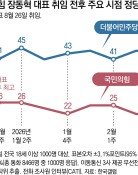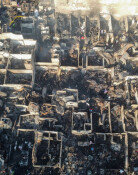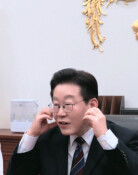‘Kim Jong Un-ism’ in his 10th year in control
‘Kim Jong Un-ism’ in his 10th year in control
Posted October. 30, 2021 07:39,
Updated October. 30, 2021 07:39
In celebration of his 10th anniversary of ruling the regime, North Korean leader Kim Jong Un ordered pictures of his predecessors – Kim Il Sung and Kim Jong Il – in the party’s meeting venues to be got rid of and the term “Kim Jong Un-ism” to be put to use internally, said the National Intelligence Service of South Korea in a parliamentary inspection of the administration held on Thursday. Analysts see a series of changes led by Kim as attempts to differentiate his system of ideologies from those built by his grandfather and father. It has also been reported that Pyongyang calls on Washington and Seoul to suspend their joint military drills and lift sanctions on mineral exports and imported oil before it comes back to the negotiating table to discuss a declaration of end of war.
Kim Jong Un-ism is considered a term that shows dogmas that lay the foundation of the Kim Jong Un era that encompasses the principles of “Our People First” and “Our Nation First.” Although the suffix of “ism” is used by the regime only for foregoers, it is attached behind the name of Kim Jong Un, implying how hard those in power struggle to solidify the system under Kim Jong Un’s rule. As he is described as “another great supreme leader (Suryong), albeit unofficially, he seems to join the ranks of Suryong – the title which has been limited to his grandfather.
As Kim in January became the General Secretary of the Workers' Party in the party’s eighth congress, he left “Kim Il Sung-ism” and “Kim Jong Il-ism” behind on a page on his predecessors’ era in history by making a revision to the party’s rules. Removing the “military first” principle of his father’s era, Kim put “Our People First” above anything else. Added to this, since the regime carried out long-range nuclear missile launches in 2017, he has promoted “Our Nation First” while arguing that it become one of the world’s most strategic nations. However, Kim Jong Un-ism characterized by his focus on his people and nation is only an empty ideological attempt to turn a blind eye to the severity of the realities for his 10 years in power.
Since the death of Kim Jong Il in December 2011 brought power to his son, Kim Jong Un has forced the upper class to show loyalty by killing his family members and close officials while instilling elusive images of nationalism supported by nuclear arms in the minds of the people, leading the system to mobilize his people. Although he raised expectations of the regime’s openness and innovation three years ago when he joined a political show on denuclearization on the global stage, he turned out to be the main culprit behind the regime’s return to one of the most closed and reclusive nations in the world. As a result, a severe food crisis hit North Korea hard, about which he has expressed concerns directly.
Kim Jong Un even shows some slow but explicit signs of engagement in dialogue by saying that Washington and Seoul are not Pyongyang’s main opponents anymore, a reflection of the level of severity that he has felt. Nevertheless, Kim only makes nonsensical demands by falsely believing that a mere joining of the negotiating table can be the best card that he can play. Although he may calculate that he will lay hold of nuclear weapons as long as possible, it will result in the end to his 10 years’ power ending up with devastation and disaster. The starving people will never stay loyal to their “suryong” with nuclear weapons in his hands.







